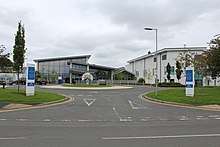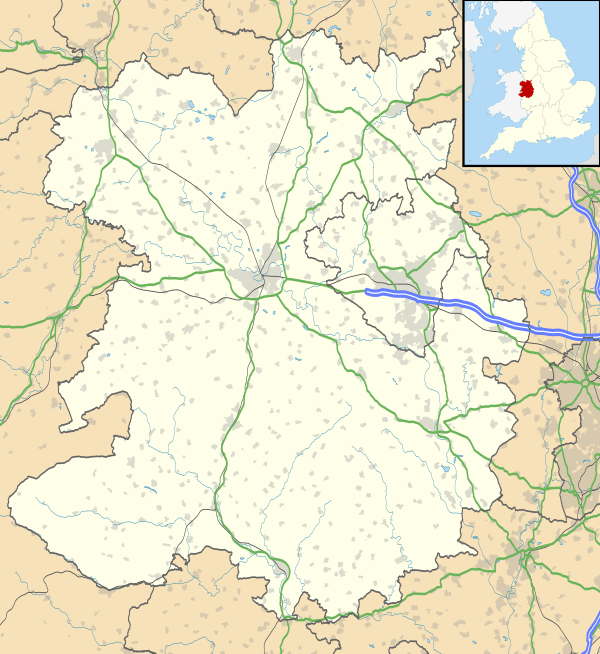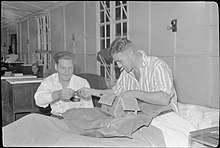Robert Jones and Agnes Hunt Orthopaedic Hospital
| Robert Jones and Agnes Hunt Orthopaedic Hospital | |
|---|---|
| The Robert Jones and Agnes Hunt Orthopaedic Hospital NHS Foundation Trust | |
 The entrance to the Robert Jones and Agnes Hunt Orthopaedic Hospital | |
 Shown in Shropshire | |
| Geography | |
| Location | Oswestry, Shropshire, England, United Kingdom |
| Coordinates | 52°53′03″N 3°01′56″W / 52.8842°N 3.0323°WCoordinates: 52°53′03″N 3°01′56″W / 52.8842°N 3.0323°W |
| Organisation | |
| Care system | Public NHS |
| Hospital type | Specialist |
| Services | |
| Emergency department | No Accident & Emergency |
| Speciality | Orthopaedics |
| History | |
| Founded | 1900 |
| Links | |
| Website | http://www.rjah.nhs.uk/ |
| Lists | Hospitals in England |
| Other links | Agnes Hunt |
The Robert Jones and Agnes Hunt Orthopaedic Hospital (RJAH) in Oswestry, Shropshire, England is a specialist orthopaedic hospital which provides elective orthopaedic surgery. It is managed by the Robert Jones and Agnes Hunt Orthopaedic Hospital NHS Foundation Trust.
History

The hospital was originally established in Baschurch by Miss Agnes Hunt as the Baschurch Children's hospital in 1900.[1] Agnes Jones consulted Sir Robert Jones, after whom the hospital is also named, about her own illness in 1903 and he became honorary surgeon to the hospital in 1904.[2] The hospital moved its present site in Oswestry as the Shropshire Orthopaedic Hospital in 1921[3] and became the Robert Jones and Agnes Hunt Orthopaedic Hospital in 1933.[2] The hospital took in badly-injured patients under the Ministry of Health's Emergency Medical Service during the Second World War.[2]
John Charnley, the leading orthopedic surgeon, worked in the hospital for six months in 1946.[4] It joined the National Health Service in 1948 and achieved NHS Trust status in 1994.[5] Following a major building programme, the Midlands Centre for Spinal Injuries re-opened in 2001.[2] The hospital was awarded NHS Foundation Trust status in August 2011.[5]
Seven-day working
The hospital is a pioneer of seven-day working. Weekend work began with surgeons carrying out waiting list initiatives to deal with the problem of access times for the NHS. Researchers at the Dr Foster Intelligence Unit at Imperial College London looked at more than 4 million elective procedures across the UK in 2008-11. They found that the risk of death was 44 per cent higher if the patient was operated on a Friday and 82 per cent higher if operated on over the weekend. The Trust carries out about 10,000 procedures a year and in 2000-12 recorded 33 deaths after elective orthopaedic procedures. They found there was a lower mortality risk on Friday and on Saturday; at 0.008 per cent for Friday and 0.014 per cent on Saturday, with an average mortality rate for the trust at 0.023 per cent.[6]
Performance
It was named by the Health Service Journal as one of the top hundred NHS trusts to work for in 2015. At that time it had 1101 full-time equivalent staff and a sickness absence rate of 3.23%. 93% of staff recommend it as a place for treatment and 71% recommended it as a place to work.[7]
Wendy Farrington Chadd, the chief executive, resigned in September 2015, citing a desire for a new challenge after eight years in the job. Under Mrs Farrington Chadd's leadership, the Trust got on a secure financial footing and invested in a number of significant capital projects. It was also investigated by Deloitte, a report commissioned by the trust itself, after an alert from a Whistleblower found that from December 2013 to January 2015 an average of 424 patients had been excluded from the waiting list for surgery. The effect was that the trust "improved the performance above the 92 per cent national target. As such, it is clear to see that without the removal of these, the trust would not have met the national target for this indicator."[8]
The Trust has estimated it could to lose up to £8m in income, 16% of its turnover, during 2016-17 under changes to the NHS tariff which are set to affect all specialist orthopaedic hospitals, though discussions are ongoing with Monitor and NHS England to find a solution.[9]
See also
References
- ↑ Abel-Smith, Brian (1960). A History of the Nursing Profession. London: Heinemann. p. 30.
- 1 2 3 4 "Dates in the History of the Hospital and its Founders" (PDF). Robert Jones and Agnes Hunt Orthopaedic Hospital NHS Foundation Trust. Retrieved 9 September 2018.
- ↑ "HSJ reveals the best places to work in 2015". Health Service Journal. 7 July 2015. Retrieved 23 September 2015.
- ↑ Waugh, William (1990). John Charnley: The Man and the Hip. Springer-Verlag London Limited. p. 33-34. ISBN 3-540-19587-4.
- 1 2 "History". Robert Jones and Agnes Hunt Orthopaedic Hospital NHS Foundation Trust. Retrieved 9 September 2018.
- ↑ "Hundreds of patients 'excluded' from specialist trust's waiting list". Health Service Journal. 6 August 2015. Retrieved 5 October 2015.
- ↑ "HSJ reveals the best places to work in 2015". Health Service Journal. 7 July 2015. Retrieved 23 September 2015.
- ↑ "Hundreds of patients 'excluded' from specialist trust's waiting list". Health Service Journal. 6 August 2015. Retrieved 5 October 2015.
- ↑ "NHS orthopaedic hospitals warn of funding crisis due to payment changes". The Guardian. 29 October 2015. Retrieved 30 October 2015.
External links
- Shropshire History
- The Robert Jones and Agnes Hunt Orthopaedic Hospital NHS Foundation Trust
- OsCell is a dedicated website to The Robert Jones and Agnes Hunt Orthopaedic and District Hospital for the medical and science teams to provide information available for patients and current work
- Orthopeadic Institute is a charity that helps The Robert Jones and Agnes Hunt Orthopaedic and District Hospital in Oswestry and also runs medical courses and books for doctors